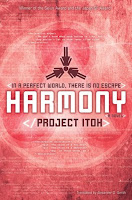 Author: Tow Ubukata
Author: Tow Ubukata
Translator: Edwin Hawkes
U.S. Publisher: Viz Media
ISBN: 9781421537641
Released: January 2011
Original release: 2003
Awards: Nihon SF Taisho Award
Mardock Scramble by Tow Ubukata was originally released in Japan in 2003 as a three volume series, granted with a month of one another. Also in 2003, Mardock Scramble won Ubukata the 24th annual Nihon SF Taisho Award. The three books—The First Compression, The Second Combustion, and The Third Exhaust—were published in an English translation by Viz Media’s Japanese speculative fiction imprint Haikasoru as a single, massive tome. Haikasoru’s edition of Mardock Scramble was released in 2011 with a translation by Edwin Hawkes. Mardock Scramble is the first of Ubukata’s novels to be made available in English although at least two of his manga series, the first three volumes of Pilgrim Jäger and the entirety of Le Chevalier d’Eon, have seen publication in English. The manga adaptation of Mardock Scramble is scheduled for English release in August 2011 from Kodansha Comics and an anime adaptation was released in 2010.
Rune-Balot was fifteen when she was murdered by her benefactor Shell-Septinos. Balot’s life was a difficult one; she was abused as a child and forced into prostitution. A part of her wanted to die, but another part wanted to live. Two PIs investigating Shell at the time of Balot’s death were able to rescue her. Eager to prove their usefulness to society, they initiated the life preservation program Mardock Scramble 09. Balot’s body is combined with highly advanced and normally illegal technology, giving her her life back along with super human abilities. She, who had been powerless for so long, could now fight back. Along with the support of the PIs, Dr. Easter and Oeufcoque, who have some interesting capabilities of their own, Balot is eager to get her revenge. But shell isn’t completely defenseless. His extremely powerful and brutal bodyguard Boiled, who also happens to be Oeufcoque’s old partner, is more than prepared to nullify Balot’s existence.
I find Mardock Scramble difficult to classify. It’s definitely speculative fiction, and most likely science fiction although it doesn’t always feel that way. I’ve also seen the series referred to as cyberpunk, which almost fits. But whatever it is, Mardock Scramble is a lot of fun. For the most part. The action sequences and gun fights are exciting and easy to follow; the characters are likeable and interesting, each with their own quirks and unique personalities. The frequent egg puns and references were a bit odd, but fit well with the vague strangeness of the story. The technology might not always be believable, but some of it is, and even if it’s not it’s still pretty cool. I didn’t quite understand some of the worldbuilding; the bizarre legal and law enforcement system is still a mystery to me, which is unfortunate since it’s fairly important to the story.
I am very glad the Haikasoru decided to publish Mardock Scramble as a single volume, otherwise I’m not sure I would have finished the series and that would have been a pity. I loved the first book, enjoyed much of the second, and thought the action packed ending of the third was great. But in the middle of the quickly paced story, there’s a lengthy scene that takes place in a casino that slows things down tremendously. I didn’t mind this at first, and even enjoyed it and found it interesting to some extent. But after one hundred eighty pages of Blackjack, I was getting impatient. Maybe if it was a gambling game that I actually cared about, like Mahjong, I would have been okay. But I don’t give a damn about Blackjack, even if it was necessary for the story. Overall though, I did enjoy Mardock Scramble: I liked the quirky characters, I liked their captivating backstories, I found the twisting plot to be entertaining. And Hawkes’ translation is fantastically smooth. With the creativity displayed by Ubukata in Mardock Scramble, I wouldn’t mind exploring some of his other works.

